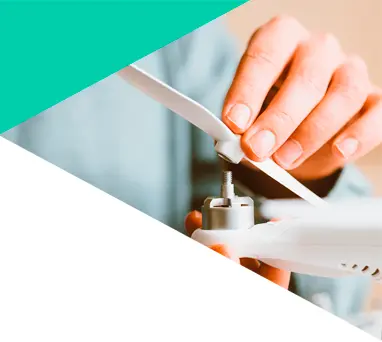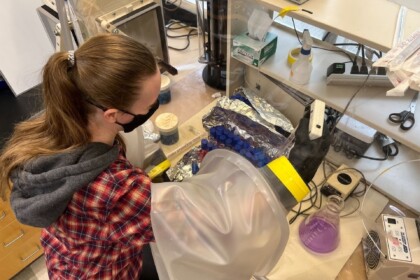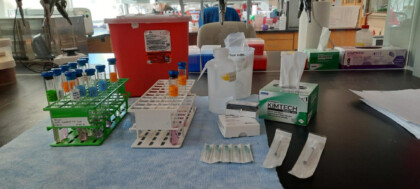
STEM In The Community

A Student's Perspective: CC-CREW Research Experience at WHOI for Community College Students

By Shayla Flaherty
I found out about the CC-CREW Research Experience in Dr. Julie Huber´s Lab at Woods Hole Oceanographic Institution (WHOI) from my Biology I teacher, Dr. Gretta Serres, at Cape Cod Community College. She introduced the program in class and I met with her after to discuss the details about the research experience in the Huber Lab. That summer, I reached out to her and she invited me to WHOI to meet the students in the program at the time, showed me around the Huber lab, introduced me to the research project, and took me to the conference where the students presented their summer research.
That day, I asked every student in the program what they thought about the experience and if they would recommend applying. Instantly, everyone answered the same way: “yes, definitely” without any hesitation. They assured me that they grew personally and professionally through the experience and that I could not pass up the opportunity. After my visit, I knew that I wanted to commit to the program and applied on the WHOI website.
At the lab meetings, all of the scientists interacted with each other in a way that showed they respected one another and saw each other as a community. A community of like-minded individuals that were all thrilled about the wonders of science.
At first, I was concerned about working in a lab setting. Prior to the program, I had no experience working in a lab, as my science classes were all online due to COVID. However, my concerns were soon appeased as I spent some time learning my way around the lab. I learned all about the lab equipment, how to find it on my own and how to perform measurements. I used microscopes, pipettes, gel electrostatics and PCR kits, anaerobic chambers, PH indicators, gene analysis computer tools, and more. I also expanded my science vocabulary by learning terms such as autoclaving, inoculating, and DAPI staining. As soon as I started, I asked a lot of questions. Dr. Gretta Serres, the program coordinator and mentor, welcomed my questions and addressed every one. I received a lot of encouragement through my entire time in the lab.

I participated in the CC-CREW program in the fall, so my experiences may differ from the summer version of the program. However, in the fall, I was introduced to many different aspects of the institution, even more than I expected. In the morning, I met with my mentor, Dr. Gretta Serres, and reviewed the research articles I was advised to read. She addressed any questions I had about the research or the internship in general. Afterwards, I headed to the lab and got started on the goals and tasks of that day’s research.
Some days I spent making the “media,” which was used to cultivate the bacteria for the experiment. I followed an ingredient sheet, much like a recipe. Other days, I viewed the microbes under the microscope. Sometimes I ran a polymerase chain reaction on the bacteria’s DNA or followed new procedures to help get the proper growth conditions for the bacteria. In the lab, my mentor always prepared me on what to expect and gave me reminders. At the same time, I had the space to try to figure things out on my own and the support to ask questions.
After the time in the lab, we regrouped and discussed what we had discovered that day and the ongoing steps of the research project. Once a week, I also was able to attend lab meetings held by the lab group made up of PhD students, postdocs, and professional scientists, where I shared what I was working on in the lab and learned about the other science projects taking place down the hall. Lab meetings were one of my favorite parts of the CC-CREW experience. I was able to learn about other science opportunities, communicate directly with scientists about their projects, and provide feedback to the postdocs in the lab about the projects they were working on. Through these meetings, I began to pick up more scientific terms and I grew in my understanding of the lab protocols. I felt my skills in science communication growing with practice.
Scientists working on groundbreaking research were everywhere! All that I needed to do was strike up a fascinating conversation with a simple “hello.”
At the lab meetings, all of the scientists interacted with each other in a way that showed they respected one another and saw each other as a community. A community of like-minded individuals that were all thrilled about the wonders of science. The atmosphere was friendly and innovative and all questions, suggestions, and ideas were wholeheartedly accepted. Colleagues devoted their free time to helping others work on a project, whether that meant providing them with their materials, helping them curate a computer program, or listening to their presentations to provide informative and helpful feedback before a public showcasing.
My mentor and I also attended events at WHOI. Some of the events were events I was interested in learning more about and some were just to learn about the projects that were taking place throughout the entire institution or at institutional partners. These events also introduced me to the many career paths and opportunities within the science field.
Scientists working on groundbreaking research were everywhere! All that I needed to do was strike up a fascinating conversation with a simple “hello.” When I opened up about my struggles with feeling accepted and valued as a beginner in the science field, these world-class scientists reassured me that they too felt that way when they started. They told me that they were able to overcome these self-barriers with practice and persistence.
When I opened up about my struggles with feeling accepted and valued as a beginner in the science field, these world-class scientists reassured me that they too felt that way when they started. They told me that they were able to overcome these self-barriers with practice, patience, and persistence.
The experience in CC-CREW is irreplicable. I decided to accept the position in the program because I knew that it would further my science foundation. But the experience taught me more than how to use microscopes, run PCRs, and transfer media. I gained a great deal of confidence with my abilities and a sense of belonging in the science world. I was welcomed with smiling faces. I was considered one of the researchers, without regard to my age or education level. The most beneficial aspect of the research experience was seeing that there was a place for me within the science field, and that I had the capabilities, drive, passion, and knowledge to continue in the field.
~~
Applications for CC-CREW for Summer 2023 are open until March 24th. The program is open to any student currently enrolled in a community college. Past participants include students from Cape Cod CC, Massasoit CC, Mt Wachusett CC, Bunker Hill CC, Bristol CC, Quinsigamond CC, and Rhode Island CC.
The CC-CREW Research Experience at Woods Hole Oceanographic Institution is a paid ($17/hr), full-time, non-residential research experience. The summer session takes place from June 13 to August 11th and requires 40 hours per week. Fall and spring sessions of the program are also offered for-credit during the school year.
To learn more about the program including how to apply, visit the website here. If you enjoyed reading about Shayla’s experience, you may also enjoy reading about CC-CREW alum Nick O'Sadcia, and one of WHOI’s newest Alvin pilots here.